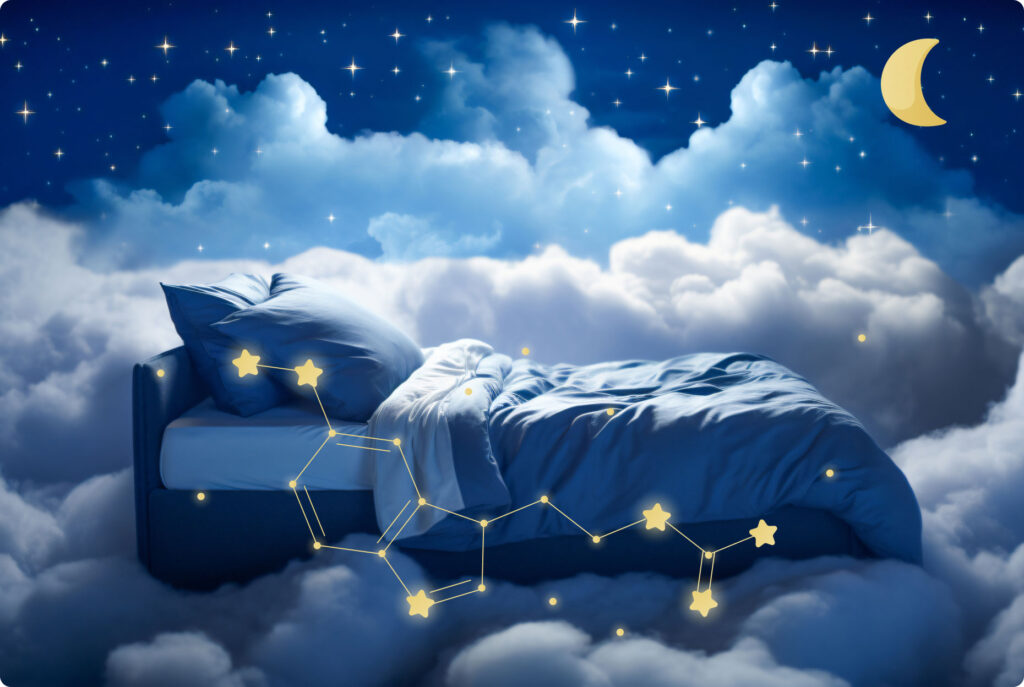By Elizabeth Weiss


Sleep issues can be an ongoing problem for adults with ADHD, and the sleep deprivation that results from this lack of rest can worsen ADHD symptoms.
But a dietary supplement called melatonin can help. The supplement uses the same compound that occurs naturally in the body. And some people — with and without ADHD — have found it can help them sleep.
Still, if you have ADHD and sleep problems, you need to consider the possible pros and cons of using melatonin.
ADHD and Sleep Problems
Difficulty falling asleep because of an overactive mind and delayed sleep-phase syndrome are common sleep impairments among people with ADHD, says Dr. Chester Wu, psychiatrist and sleep specialist in Houston and medical reviewer at Rise Science. Other problems include:
- Delayed sleep onset, meaning it is difficult to fall asleep until significantly later than the conventional bedtime.
- Difficulty waking up at the desired time in the morning.
- More awakenings during the night.
- Poorer overall quality of sleep.
“A lack of sleep can induce ADHD symptoms, and having ADHD makes you more likely to experience sleep disturbances,” says Dr. Rebecca Jackson, a chiropractic doctor and brain wellness expert. “A tired brain has difficulty paying attention, recalling information, overriding impulses and controlling emotional reactions. Individuals with ADHD already struggle with one or more symptoms and a lack of sleep only exacerbates these challenges.”
Quality sleep is a necessity for productivity and overall well-being.
“Research has shown that shifts in sleep and wakefulness patterns for someone with ADHD can come from differences in the timing and amount of natural melatonin being released, setting the brain’s pattern of sleep and wakefulness,” Jackson says.
Natural Melatonin in People With and Without ADHD
Everyone’s body makes melatonin naturally. Darkness prompts the pineal gland to produce melatonin at night. However, behavior impacts whether melatonin production is successful.
Light causes the natural production of melatonin to stop, which means the circadian rhythm and the sleep-wake cycle of the body go unsynchronized and interfere with the sleep transition.
And humans often interrupt natural darkness with unnatural light — especially from the overuse of mobile phones and tablets at night. These devices produce blue light than interrupts that darkness and can affect sleep.
And, in adults with ADHD, the natural production of melatonin gets interrupted in additional ways.
“There is a substantial association between ADHD and delayed sleep phase disorder, a circadian rhythm sleep disorder prevalent in approximately 73 to 78% of individuals with ADHD,” says Wu. “Individuals with circadian rhythm sleep disorders often experience a delay in the natural production of melatonin, leading to difficulty falling asleep at conventional bedtimes.”
The result: The alteration in melatonin secretion can result in a shifted sleep phase.
That means that people:
- may feel more alert in late evening.
- face challenges in being able to wake up early.
- often have lower quality and duration of sleep.
Wu says experts still don’t know why people who have ADHD and circadian rhythm sleep disorders have a more difficult time falling asleep than people without such difficulties. One scientific theory, he says, is the brain’s synapses have a reduced responsiveness to melatonin.
When this responsiveness to melatonin is low — even if melatonin levels are adequate — the neural response may be subdued. As a result, this potentially “impacts the regulation of sleep-wake cycles and circadian rhythms, leading to difficulties in initiating sleep or maintaining regular sleep patterns,” Wu says.
Pros and Cons of Melatonin Supplements for the ADHD Brain
Even though melatonin is a natural element in the body, melatonin supplementation isn’t for everyone. It’s critical to consult with a doctor to discuss appropriate dosage and timing, especially if you take medication for ADHD or other conditions.
“Melatonin is often taken in excessive amounts and at incorrect times,” says Wu.
That can impact restfulness and cause grogginess upon waking, he says.
Also, as with any supplement, there are pros and cons to melatonin and how it affects the ADHD brain.
Here are some benefits to taking melatonin supplements if you have ADHD:
• Helps shift sleep schedules
Melatonin supplementation is effective in shifting sleep schedules for people with ADHD. If you stay up too late, melatonin could help fix this daily pattern.
“If your sleep struggle involves challenges with falling asleep, melatonin is a low-risk option that may reduce this time and increase the time spent sleeping,” says Jackson.
Melatonin can shift the time a person goes to sleep forward by approximately 1.5 hours.
• Can be especially effective with light therapy
Melatonin taken at a low dose in late afternoon or early evening combined with light therapy early in the day can advance sleep schedules and shorten sleep onset for those with ADHD and circadian rhythm disruption, Wu says. Bright light therapy used consistently first thing in the morning has shown to improve shifting sleep patterns, signaling to the brain that it is time to be awake and resetting circadian rhythms of sleep and wakefulness, Jackson says. Some research shows the combination of melatonin and light therapy can be more effective than melatonin supplementation alone.
Here are some disadvantages to melatonin supplementation for people with ADHD:
• Some side effects
Melatonin is generally considered low risk for side effects, but that doesn’t mean they’re non-existent. Jackson says common side effects include daytime sleepiness, headaches, nausea and
dizziness.
“Less common but more severe side effects include reports of depression,” Jackson says,
• Inconsistent results
Melatonin can be helpful for some people with ADHD, but it does not always deliver the same results. Though the sleep aid can shorten the time it takes to fall asleep and increase the total time spent asleep, its effects are inconsistent across multiple studies and classified as “preliminary evidence,” says Jackson.
Are Melatonin Supplements for Everyone?
Sleep issues are common — in people with and without ADHD. Sleep issues can be a symptom and side effect of ADHD, and can exacerbate other ADHD symptoms.
For many, taking melatonin supplements can deliver good results.
But melatonin is not a cure-all for sleep issues. And, as with all over-the-counter supplements, you should take melatonin only after you’ve discussed it with your doctor.





